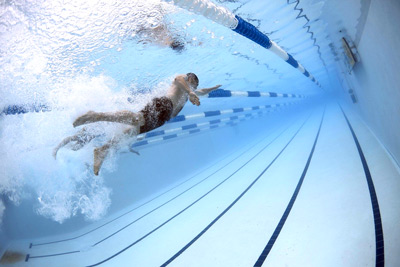
Bromine and chlorine are chemical compounds that serve a similar purpose: they decontaminate pool and spa water by killing bacteria. However, these chemicals differ in the way they clean, react to temperature, and interact with skin. If you’re considering bromine vs. chlorine for use in a pool or spa, our guide will help you choose the option that’s best for your situation.
Bromine vs. Chlorine: What is the Difference?
The way these compounds go to work is different, but they have the same goal in mind.
When you add chlorine to spa or pool water, the chemical cleaning process is called oxidation. This means chlorine steals electrons from the gunk, essentially changing the molecular structure of the contaminants. This process leaves behind a waste byproduct called chloramine, which is the cause of that distinct chlorine smell and dry skin we associate with the chemical.
Bromine works by a process called ionization, which forces apart the contaminant’s chemical bonds. It also has a lower pH than chlorine, so it helps balance the chemistry of spa or pool water.
There are many pros and cons to each chemical compound, which we’ve broken up into categories:
- Physical Form
- Dosage
- Effectiveness
- Cost
- Health & Safety
Physical Form
Chlorine comes in several forms, including sticks, tablets, and dry granules. The tablets are the most popular because they’re the least maintenance-intensive option. Bromine also comes in tablets and granules, dissolving similarly to chlorine.
Dosage
It’s important to consider the amount of each chemical needed to perform the same job*. A general rule is to aim for the higher end of the spectrum when it comes to the number of chemicals you use:
- Chlorine: 1-3 ppm (parts per million)
- Bromine: 3-5 ppm (parts per million)
Though you need more bromine to clean the same amount of water as chlorine, you have to add chemicals less often, so the dosage will even out over time; you may even use less bromine overall.
*Be sure to consult the manufacturer’s instructions on your chemicals before adding anything to a spa or pool, as each will have its specifications.
Effectiveness
Both chemicals destroy contaminants, but the difference is their reactivity rate.
Chlorine works faster to kill contaminants but for a shorter period, as it dissipates faster. Bromine kills contaminants more slowly but for a longer period; plus, it can help keep water chemistry more balanced due to its low pH, meaning less chemical adjustment is needed.
Bromine is more stable than chlorine, especially in warm water, making it more commonly used in spas, whereas chlorine is more often used in pools. The exception to this is ultraviolet (UV) light, which destroys both chemicals, but bromine breaks down more quickly.
Cost
Cost is one of the main differences between bromine and chlorine, with bromine costing up to double the price of chlorine. This is a big part of why pool owners typically go with chlorine over bromine since you need much more of the chemical for pools than for spas. The necessary equipment for bromine costs slightly more as well, requiring a floating feeder system.
Health & Safety
If you use both bromine and chlorine according to the manufacturer’s instructions, they are safe for humans. Side effects depend on how sensitive you are to certain chemicals.
Chlorine can be harsh for those with sensitive skin or eyes or those with breathing conditions such as asthma. Bromine is a great alternative because it’s less abrasive, less chemical-smelling, and less likely to trigger asthma attacks. However, bromine does leave a lingering smell that is harder to scrub off than chlorine.
If someone is allergic to chlorine, bromine is not a safe alternative because it is still chlorine-based.
Which to Choose: Chlorine vs. Bromine
Ultimately, both chemicals are very effective sanitizers for pools and spas. Whether you choose bromine instead of chlorine or the other way around depends on your unique situation and personal preferences.
Whether you decide to use chlorine or bromine, do NOT do any of the following:
- Mix the chemicals in water; this can cause a dangerous reaction. If switching from one to the other, you’ll need to do a full drain, clean, and line flush
- Mix compounds in a dry state, which can also cause a reaction
- Store them next to each other, as fumes can become combustible
- Use the same feeder for both compounds, even if cleaned thoroughly
Contact the Experts at Halogen Supply
Offering one of the oldest inventory catalogs in the industry, Halogen Supply has consistently provided the highest-quality pool and spa products for over 80 years. If you have questions about which pool or spa sanitizers are right for you, please contact our experienced team today!


